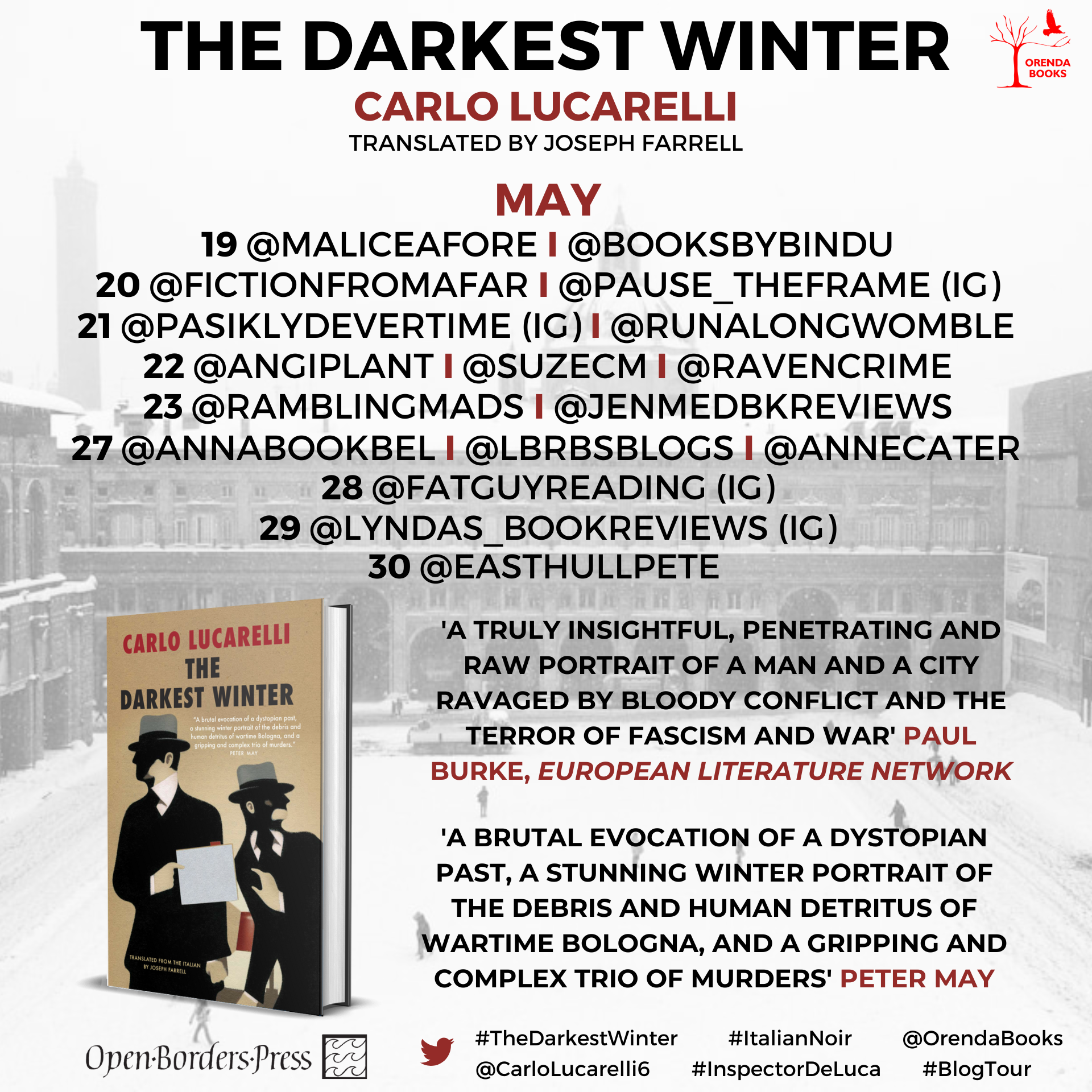The Darkest Winter by Carlo Lucarelli translated by Joseph Farrell
I would like to thank Orenda Books, Open Borders Press and Random Things Tours for an advance copy of this novel in exchange for a fair and honest review
Publisher - Orenda Books /Open Borders Press
Published - 22/5
Price - £18.99 hardback £7.99 ebook
In November 1944, in the worst winter ever known in Bologna, in the depths of the war, the bomb-scarred streets are home to starving refugees who have fled the advancing Allies. The Fascist Black Brigades, the officers of the S.S. and the partisans of the Italian Resistance compete for control of the city streets in bloody skirmishes.
Comandante De Luca, who has proved himself "the most brilliant investigator" in Bologna, but who is now unwillingly working for the Political Police in a building that doubles as a torture facility, finds himself in trouble when three murders land on his desk: a professor shot through the eye, an engineer beaten to death, and a German corporal left to be gnawed on by rats in a flooded cellar.
De Luca must rapidly unravel all three cases with ten lives on the line: ten Italian hostages who will face a Nazi firing squad if the corporal's killing is not solved to the German command's satisfaction.
As he navigates a web of personal and political motivations – his life increasingly at risk – De Luca will not stop until he has uncovered the dangerous secrets concealed in the frozen heart of his city.
The detective is often seen as a force for justice. The enabler who finds the evil culprit and helps the world recover from a despicable act. Guts. But a detective may also be more interested in the challenge. Sherlock Holmes only really liked the harder cases coming to his door. Perhaps a defective can become so fixated on the puzzle they can avoid the wider injustices around them. That is the intriguing premise behind Carlo Lucarelli’s historical thriller The Darkest Winter (well translated by Joseph Farrell which presents a man challenged with three suspicious deaths but against a background of Bologna in WW2.
By 1944 Bologna is besieged. Internally ran by a mix of Mussolini’s Fascists and German soldiers it’s a time of rationing, air raids and extreme winter cold. Commandante De Luca works for the police and tried to not think about what he knows goes on in the cells. His reputation has always been as a skilled investigator but in a short space of time three bodies are found requiring his attention. One of which is a German Soldier and if he cannot apprehend the culprit then ten people will be shot in retaliation. De Luca juggles his three cases alongside the many factions of power in Bologna to find the truth as a deadline looms.
Jumping out of this novel is the setting. Bologna here feels a place almost like the world ending. Covered in snow and ice, bombed buildings and even with farm animals gathering for shelter in town squares. It’s a city regressed and shattered feeling very broken, secretive and dangerous. Lucarelli has created a place that is not picturesque or joyful but one full of darkness and casual cruelty. This then gets further enhanced when we realise our main character De Luca is himself part of the fascist state ruling the city tensely.
De Luca is the character that really stands out. We soon see someone who enjoys a mystery to solve, looks at the options and follows the evidence. He is extremely dogged in not giving up and not afraid to push those in power to support his investigation. At the same time a big part of the novel is working out does De Luca actually have any morality beyond sorting out the case. He is aware of what the German and Fascists officers authorise and he knows many prisoners picked up are never seen again. At the same time he is not showing he supports their actions. Is he a man that just moved his occupation their way as that is what he wants to do. There is little backstory as to what made De Luca choose his career but as we see a man who rarely sleeps well this hints deep down he knows he is on the wrong side.
To aid this in the novel are the three mysteries De Luca must wrap up. Each ties to one of the major powers in the city - the fascist, the German Army and also the partisans fighting back. Each case isn’t as simple as it first appears and the murky politics of the city are a huge factor in each. We get to follow De Luca and see more of how Bologna at the time worked (or not) and it starts to push at De Luca’s moral compass but throughout we wonder how far he can or even wants to resist. Each has a satisfying resolution but the book’s denouement underlines that justice in a fascist city doesn’t always mean happy endings for everyone and this is a world of violence and cruelty.
The Darkest Winter was a fascinating look at a world I knew little about and really captured the feeling of a very dangerous place where our main character isn’t really sure any more whose side he is on. A really engaging read.

